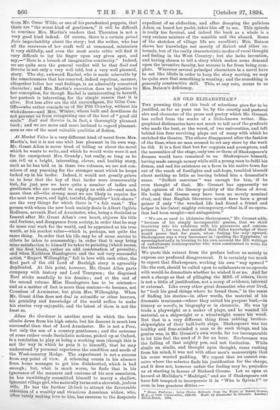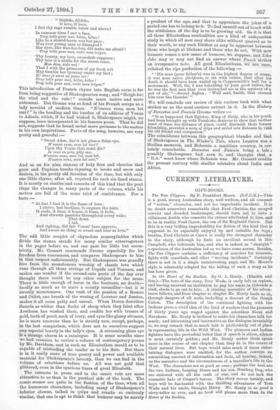AN OLD ELIZABETHAN.* TEN punning title of this book of
selections goes far to be justified, as far as puns can be, by the courtly and pastoral airs and character of the prose and poetry which Mr. Grosart has culled from the works of a little-known writer. Bio- graphical dictionaries have not much to tell us of the graduate who made the best, or the worst, of two universities, and left behind him four surviving plays out of many with which he enriched the theatre. The others disappeared after the fashion of the time, when no man seemed to set any store by the work he did. It is a fact that but for copyists and prompters, and the necessities of the stage, only two or three of Shakespeare's dramas would have remained to us. Shakespeare himself, having made enough money while still a young man to fulfil his dream, and end his existence on a farm in his native town far out of the reach of footlights and call-boys, troubled himself about nothing so little as leaving behind him a dramatist's name. "Sufficit meruisse was enough for him, if he even thought of that. Mr. Grosart has apparently no high opinion of the literary probity of the Swan of Avon.
He holds that Greene may have been no merely nominal rival, and that English literature would have been a great gainer if only "the wrecked life had found a friend and helper in his (later) mighty cotemporary,—that is, if eo-opera- tion had been sought—not antagonism."
"We are so used to idolatrise Shakespeare," Mr. Grosart adds, because of his simply incomparable genius, that we shirk inquiring into his relations with hi precursors and contem- poraries. I, for one, feel satisfied that fuller knowledge of these would prove that for years, when fooling his way upward, Shakespeare was a very buccaneer in spoiling the Egyptians,' or unmetaphorically in turning to his own account the MS. writings of unfortunate contemporaries who were constrained to write for the theatres."
We quote this extract from the preface before us merely to express our profound disagreement. It is certainly too much to expect that Shakespeare, working his own "way upward" like the rest, should be called upon to collaborate or co-operate with would-be dramatists whether he wished it or no. And for such a charge as that of pillaging the MSS. of others, there is not a tittle of justification, not a scrap of evidence, internal or external. Like every other great dramatist who ever lived, he "took his good things where he found them," in the sense of finding his stories—in other words, the Material of his dramatic treatment—where they suited his purpose best,—in history or novelle, in biography or in chronicle. He was by trade a playwright or a maker of plays, and he wanted his material, as a shipwright or a wheelwright wants his wood. But that is a very different thing from robbing brother- shipwrights of their half-built shipa. Shakespeare was too healthy and freeeninded a man to do such things, and his genius was, in Mr. Groevat's own words, far too incomparable to let him feel the need of it for an hour. Exuberance was the failing of that mighty pen, and not limitation. While simile on simile, and thought upon thought, came rushing from his mind, it was not with other men's manuscripts that his wage wanted padding. We repeat that we cannot con- ceive where the selector finds his justification for the charge, and it does not, however unfair the feeling may be, prejudice us at starting in favour of Richard Greene. Let us open at hazard at Mullidor's " Madrigal," and see if Shakespeare can have felt tempted to incorporate it in "Who is Sylvia P" or even in less gracious ditties • Green Pastures: beimg Choice Extracts from tho Work of Hobert Greene, Ar.A., of both Ullivorpitios, 100-92. Made by Aloxander B, Grosart. London: Elliot Stock, 1894.
" Dildido, dildido, 0 love, 0 love, I feel thy rage rumble below and above!
In summer time I saw a face,
Trop belle pour ntoi, hilas, helas !
Like to a stoned-horse was her pace : Was ever young man so dismayed ? Her eyes, like wax-torches, did make me afraid !
Trop belle pour moi, voila mon trepas.
Thy beauty, my love, exceedeth supposes- Thy hair is a nettle for the nicest roses. 7 Mon dieu, aide mai ! That I with the primrose of my fresh wit May tumble her tyranny under my feet ; He done je serai an jeune roi !
Trop belle pour moi, helm, helas !
Trap belle pour mot, voitd mon &elm."
This introduction of French rhyme into English verse is far from being suggestive of Shakespearian song ; and "Heigh-ho! the wind and the rain I" sounds more native and more autumnal. But Greene was as fond of his French scraps as a lady novelist of modern times. " N'oserez vous, mon bel amiP " is the heading and the burden of an address of Venus to Adonis, which, if he had wished it, Shakespeare might, we suppose, have incorporated in his famous poem. That he did not, suggests that he found metal more germane to the matter in his own inspirations. Parts of the song, however, are very pretty and graceful :— "Sweet Adon, dar'st not glance thine eye. N'oserez vous, mon be! ami ?
Upon thy Venus that must die ?
Je vous en prie, pity me,
N'oserez vous, mon bel, mon bel,
N'oserez vous, mon be! ami."
And so on for nine stanzas of holy fires and cherries that grow and Paphian brooks rhyming to hooks and snow and desires, in the pretty old iteration of the time, but with only one little rhyme, after all, required for each six-lined stanza. It is mostly on similes:and conceits of this kind that the poet rings the changes in many parts of the volume, while his metres are full of the same trick of contrivance. For a taste :— "At last I feel it is the flame of love :
I strive, but bootless, to express the pain, It cools, it fires, it hopes, it fears, it frets, And stirreth passions throughout every vein; That down I sat,
And sighing, did fair Venus' laws approve,
And swore no thing so sweet and sour as love."
The odd little couplet of • rhymeless monosyllables which divide the stanza stands for many similar extravagances in the pages before us, and can pass for little but eccen- tricity. Mr. Grosart commends Greene especially for his freedom from coarseness, and compares Shakespeare to him in that respect unfavourably. But Shakespeare was grandly free from the monotonous worship of classic love which runs through all these strings of Cupids and Venuses, and makes one wonder if the second-rate poets of the day ever thought there could be any other subject for the muse. There is little enough of harm in the business, no doubt— hardly so much as to scare a county councillor—but it is sweetly monotonous. One rush of the passion of a Romeo and Juliet, one breath of the wooing of Lorenzo and Jessica, makes it all seem petty and unreal. When Doron describes Samela as whiter than flocks of sheep when they faint after Arethusa has washed them, and credits her with tresses of gold, teeth of pearl, neck of ivory, and eyes like glassy streams, he is more amorous than he is strictly new, except, perhaps, in the last comparison, which does not to ourselves suggest any especial beauty in the lady's eyes. A streaming glass eye is a strange charm in a catalogue. It is some months since we had occasion to review a volume of contemporary poems by Mr. Davidson, cast in such an Elizabethan mould as to be capable of misleading the reader as to his date. But there is in it really more of true poetry and power and available material for Shakespeare's larceny, than we can find in the volume of selections before us. All was not gold that glittered, even in the spacious times of great Elizabeth.
The extracts in prose and in the comic vein are more attractive to us than is the poetical side of the book. The comic scenes are quite in the fashion of the time, when all the humorous characters, including many of Shakespeare's inferior clowns, talked in quips and cranks so curiously similar, that one is apt to think that humour may be merely a product of the age, and that to appreciate the jokes of a period one has to belong to it. To find oneself out of touch with the witticisms of the day is to be growing old. So it is that all these Elizabethan comicalities are a kind of anliquarian study in which all men may share alike without quarrel as to their worth, or any such friction as may be apparent between those who laugh at Dickens and those who do not, With new humour comes a new sense of humour, we suppose, and Lika Joke may or may not find an answer where Punch strikes an irresponsive note. All good Elizabethans, we are sure, relished the ripe perfection of the following :— " His nose (your father's) was in the highest degree of noses, it was nose autent giorificam, so set with rubies, that after his death it should have been nailed up in Coppersmith's hall for a monument. Well, Sir, I was beholding to your good father, for he was the first man that ever instructed me in the mystery of a. pot of ale!"—Second Ruffian : 'Well said, Smith, that crossed him over the thumbs.'" We will conclude our review of this curious book with what strikes us as the most carious extract in it. In the History of Dorastus and Fatonia Greene writes :— "It so happened that Egistus, King of Sicily, who in his youth had been brought up with Pandosto, desirous to show that neither tract of time, nor distance of place, could diminish their former friendship, provided a. navy of ships and sailed into Bohemia to visit his old friend and companion."
The coincidence between this geographical blunder and that of Shakespeare in The Winter's Tale, where Leentes was a Sicilian monarch, and Bohemia a maritime country, is cer- tainly remarkable. Dorastus and Fatonia bring a tale ; possibly Shakespeare had seen it, and thought that a " B.A." must know where Bohemia was. Mr. Grosart credits the present century with similar mistakes about India an Africa.







































 Previous page
Previous page